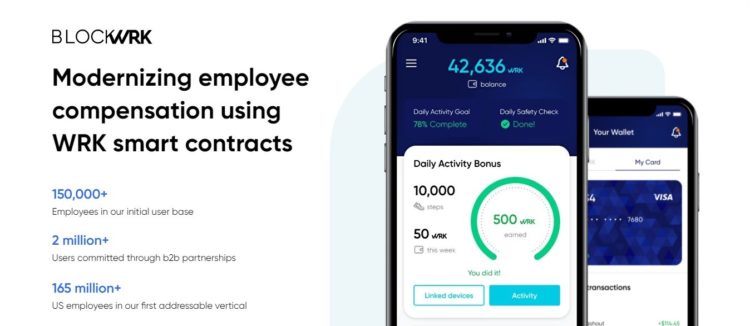The Bithumb exchange has officially listed the American blockWRK project’s native WRK token. Trading of the digital asset was launched on July 27.
The blockWRK project’s native WRK token was listed on the Bithumb exchange’s DeFi board on July
27, 2021 in the WRK/USDT trading pair. The blockWRK project’s tokenomic model foresees a total of 11,923,616,243.7293 WRK tokens being released, with the circulating supply currently standing at 85,869,296.7293 WRK.
Trading of the WRK token started at an initial starting price of $1.01 USDT. Market statistics at the time of writing show that the token has gained traction since the launch of trading and has attained a market price of $1.47 per token.
The blockWRK project is a unique HR-focused application that allows businesses to manage their workforces by setting daily, weekly or monthly goals for employees. The application includes a number of pre-installed templates that take into account key performance metrics and allow managers to include healthy, value-generating, or productivity-focused activities to be automatically rewarded in federally approved WRK tokens. The tokens are credited to employee VISA branded bank cards or accounts and can be converted into fiat, used as a means of savings, or directed at payroll.
The listing of the WRK token comes as the blockWRK project has announced the launch of its application on the US market. The partnership the company has signed with a leading local payroll provider allows it to tap into an initial user base of over 150,000 American employees. Further development of the application and the conclusion of more partnerships in the near future can pave the way for the company to access over 2 million local workers.
The demand for applications like blockWRK is substantial, considering the spread of teleworking in the wake of the COVID-19 pandemic. Remote working may remain a permanent feature of the future working environment, given that a recent survey reports that 4/10, or 36%, of employees in the US would prefer to quit their jobs, rather than return to an office setting.
On the company side, the need for tools for employee motivation is becoming acute in light of the recent dynamics in workforce preferences. According to a recent survey by Statista, 64% of respondents from the United States plan on investing in tools for training managers to manage a more virtual workforce. 41% of companies invest in productivity management tools to support remote workforce during the pandemic.
Credit: Source link













































































































































